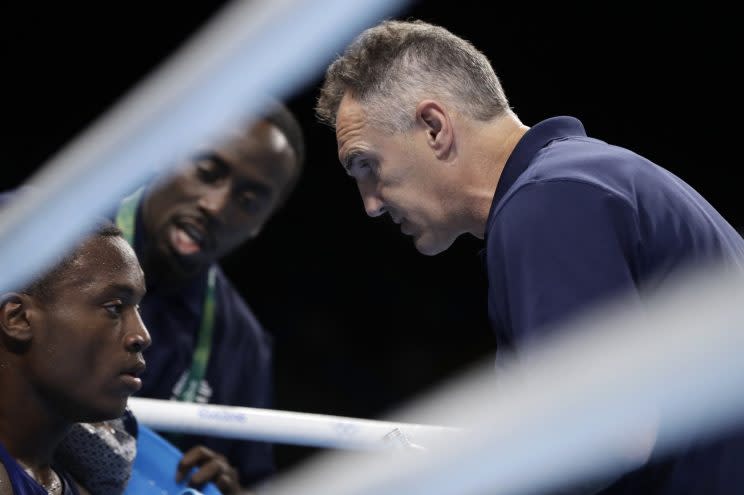USA Boxing is rolling at Olympics, despite lack of respect from USOC
Medal count | Olympic schedule | Olympic news
RIO DE JANEIRO — Each morning, the United States Olympic Committee sends out an email to journalists here with highlights of the performance of American athletes in the Games the day prior.
On Thursday morning, a night after two U.S. boxers won to push the team’s overall record to 6-1 and light flyweight Nico Hernandez guaranteed the Americans men their first boxing medal since Beijing in 2008, there was zero mention of those accomplishments in the USOC’s “USA Daily” email recap.
After a long list of highlights, at the bottom of the email is a second that says, “More Headlines from Rio.” If you’re looking for boxing there, don’t bother.
In the middle, there is a tab for news. Click on that and go to the sixth page and finally, there is news about USA Boxing. But is it about the men’s team’s 6-1 start? Or about Hernandez clinching a medal with three consecutive wins? No. It’s a story about the fighters’ memories of Muhammad Ali.
This is the challenge that faces new U.S. coach Billy Walsh. If he can’t get the U.S. Olympic Committee’s attention despite a far quicker than expected start, how is he going to make lasting, long-term changes to the program?
It’s a difficult proposition.
USA Boxing hired Walsh in November after an outstanding stint in Ireland that included seven Olympic medals. He was handed a five-year contract and given the task of rebuilding the moribund men’s program.
It’s not fair to boxers like Carlos Balderas, Gary Antuanne Russell and Hernandez to heap all of the credit for the team’s start on Walsh, but he unquestionably has made an impact. He understands what it takes to compete at the Olympic level and he’s gotten his fighters’ attention.
But to get long-term success, he needs to get the attention of the public. And to do that, he needs television.
Boxing fans have been frustrated trying to find the fights on NBC Sports’ coverage of the Games.
“What we saw [Wednesday], winning a medal, success on the TV,” Walsh said when asked how he gets some of the best young athletes to try boxing in the first place. That, ultimately, is going to determine whether or not he succeeds. Better athletes make a coach look a lot smarter.
“That’s where these kids get it from. Talk about whatever other sports, basketball. They see these guys on TV all the time. They’re their idols, their heroes. Boxing, amateur boxing, needs to be shown more in America, and these guys have to be heroes and role models for the kids to come.”

In addition to getting the athletes, there’s also the matter of assimilating them into the program so that there is one coach.
But the way it works now, most of them have coaches in their local communities who work with them and the Olympic coach gets them just before the Games.
It’s very common for those coaches to undermine the Olympic coach. The Olympic coach will tell the fighters one thing, because of what they’ve been working on, and the local coach will say another.
It happened during Russell’s victory over Haiti’s Richardson Hitchins on Wednesday. Russell comes from a boxing family, and all of the sons are coached by their father, Gary Allen Russell Sr.
Russell’s brother, Gary Allen Russell Jr., was a member of the 2008 U.S. Olympic team and holds the WBC featherweight title.
Russell Sr. was ringside for his Gary Antuanne Russell’s win over Hitchins on Wednesday and was shouting instructions.
Fortunately for all involved, Russell Sr.’s instructions were the same as Walsh was delivering in the corner.
“[My Dad] was telling me I had to let my hands go,” Gary Antuanne Russell said after his victory. “Go downstairs and work back up. Work behind the jab, feint, feint, touch the body, come back upstairs with a four-piece combination.
“Coach Billy, he couldn’t hear him, he was telling me the same thing. That’s good coaching. He’s sat there and studied me, and I love that about him.”
It wasn’t a problem in that instance, but it has been in the past. There can only be one coach, and Walsh has to find a way to limit the involvement of the outsiders so that his philosophy is the one to which the boxers adhere.
Otherwise, it’s chaos.
“It’s a difficult thing,” Walsh said. “I’ve spoken to the parents and tried to explain the stuff we’re working on. Thankfully, I can hear them repeating the same stuff [I’m saying]. But trying to keep their heads in the ring is another thing. You have to keep your head in the ring because you’re not going to win it outside the ring. You’re going to win it in it.”
Walsh isn’t ultimately going to be a winner, though, unless he’s able to raise the profile of his sport in the U.S. That’s going to entail getting the few journalists who cover boxing in the U.S. to include the amateurs in their coverage.
It’s going to take finding a way to convince the television networks to put major amateur events on the air.
It’s going to mean getting the public fired up about the boxing program.
And mostly, it’s going to include grabbing the USOC’s attention. If a U.S. boxer guaranteeing himself a medal for the first time in eight years isn’t enough to be noted by the USOC, Walsh’s problems are even bigger than he might have imagined when he took the gig.

 Yahoo Sports
Yahoo Sports 

